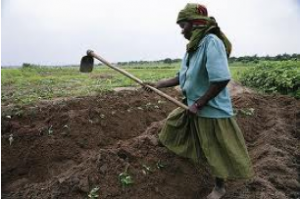Daily Graphic | 2 November 2010
European biofuel companies dangle large carrots to capture land from chiefs naïve about the impact landlessness will have on their village lives today and in the future, in what has been dubbed Africa’s neo-colonisation.
Chief Sumani Amidu of Kpachaa village in northern Ghana, has sat by as over half of his 100 villagers abandon him to seek new jobs and sources of food for their families.
Three years ago the chief sold the village land for GH¢100 for a promise that never came.
Now forced to farm himself to keep the children of the village alive, each morning on his 40-minute walk to the village’s last farming plot, he passes his old farmland now owned by a Norwegian biofuel company.
“The pain to pass my lost land each day is so big that I cry,” shared the chief with the Daily Graphic as the reporters sat with him on his yam farm. . .
Chief Sumani Amidu of Kpachaa is a captain of a sinking ship. One of the growing number of African fanners being targeted by European biofuel companies.
In Ghana alone, 37 per cent of the farmland, an area the size of Denmark, is owned by foreign biofuel companies.
The amount is increasing every day. According to the UN organisation UNCTAD, investments in farmland has increased from $600 million in 1990 to more than $3 billion a year in the period of 2005-2007.
New laws are mandating European Union states to have 15 per cent of their cars run on biofuel by 2015 and have created a hunger for cheap biofuel farmland, with Africa being an easy target.
Land grabbing happens not only in Ghana. Also Congo, Mali, Kenya, Zambia, Tanzania, Mozambique and in famine suffering countries such as Ethiopia and Sudan it has become a major issue of food security.
So how are foreign firms able to get hold of African farmland?
The firms offer monetary incentive and future job security for the villagers who have large amounts of land suitable for growing biofuel crops.
It appears that village chiefs are initially attracted by the large down-payment of money on offer from biofuel companies and then further coaxed into agreement by promises of a modem village with all the benefits of year-round employment and food.
Thirty-eight-year-old Ibrahim Habibu, owner of the Kpachaa village tractor, was full of hope about the future income he could earn by working with BioFuel Africa, his land’s new Norwegian owners.
But after only one and a half years, the company stopped working on the land, forcing Mr Habibu to quit his village life and move to the nearest big city, Tamale.
Through the charity of his brother-in-law he now lives with his daughter and 12 children in a single 10 metre-square room.
Farming the village land allowed him to send six children to school and generate a reasonable income selling excess harvest in local markets. Today, he struggles to send three of the children he cares for to school, telling the Daily Graphic that the children frequently cry from hunger before going to sleep.
Ibrahim Habibu’s tractor has been left idle since 2007.
The situation that now landless farmers affected by biofuel expansion find themselves in has become a wider social problem for national systems to manage. And the effects it is having on the next generation of farmers is forming a downward spiral of increasingly welfare-reliant people, explains Halima Sagito, Executive Director of Savannah Integrated Rural Development Aid (SIRDA).
“The biggest problem in general is the whole migration thing,” she said to the Daily Graphic.
“When people are pushed away, you can’t accommodate them, making their situation even worse than before they left. You can’t assess, what will make them survive as human beings,” she said, pointing out other concerns.
With no land, no support networks and decreasing access to education, the children of migrating farmers are in danger of being trapped in a cycle of poverty, Halima Sagito explained. They will form the next generation of welfare dependants for the nation to deal with.
For the most part, biofuel companies say they will be pursuing socially responsible practices to produce win-win situations for both investors and farmers. They outline development projects for local infrastructure, aim to increase productivity, modernise farming and bring important new knowledge to developing countries.
Good intentions or not, the reality, however, is still too often one of increasing hardship and future uncertainty for those involved.
For now, chief Sumani Amidu of Kpachaa, is keeping up the hard work in the fields trying to provide for the village’s daily needs.
He is giving the biofuel company two more years to reinvigorate production on the farmlands before he leaves the sinking ship by that time the last of the biofuel crops will be dead.
In Ibrahim Habibu’s case, he is simply not happy about life anymore, he stated.
He has lost all his dreams, all his hopes about the future. The only thing that keeps him going is a small amount of casual labour – carrying concrete and bricks now and then. A very insecure way of living, Mr Habibu emphasised: “If you don’t work, you don’t’ get any money and you can’t live. It’s that simple.”











